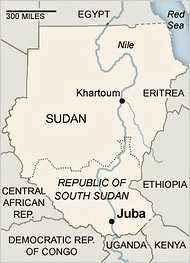The Challenge Of Governance In South Sudan

While we continue to debate over whether or not to massively roll back the welfare state, Jeffrey Gettleman's reporting from the new nation of South Sudan reminds us that more than big government or small government, what matters is government that functions at all:
Ethnicity is a consistent fault line here. The government is dominated by the Dinka, the biggest group in southern Sudan, and some of the toughest rebel armies are commanded by members of the Nuer, a historic rival.
"This is just tribal fighting," Mustafa Biong Majak, a South Sudan government spokesman, said with a dismissive wave of his hand, arguing that the clashes posed no threat to stability. "Let them die."
But many people here fear that after the glow of independence wears off, the Nuer and the Dinka, who fought viciously during the north-south civil war, will become locked in conflict again. And even within the Dinka-dominated government forces, there are deep problems. Government troops routinely take sides in local land disputes and battles over cattle, and recently soldiers have been hijacking United Nations trucks hauling food. Hunger is yet another challenge, with more than 3 million people in South Sudan, nearly 40 percent of the population, needing food aid to survive.
Public choice considerations are always relevant. But at the same time, when you look around the world in a serious way, you see a great deal of variety in government performance. A crucial issue, at all levels of governance quality, is how to make public institutions function well not to simply point to bad stories and go "well, you see, that's what you get."


Matthew Yglesias's Blog
- Matthew Yglesias's profile
- 72 followers



